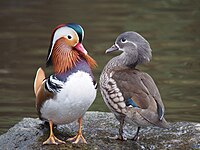
Photo from wikipedia
The Early Triassic Chaohu Fauna from Anhui Province, China, contains the oldest record of Mesozoic marine reptiles, such as Cartorhynchus and Sclerocormus. Most specimens from the fauna belong to the… Click to show full abstract
The Early Triassic Chaohu Fauna from Anhui Province, China, contains the oldest record of Mesozoic marine reptiles, such as Cartorhynchus and Sclerocormus. Most specimens from the fauna belong to the ichthyosauriform Chaohusaurus, more specifically resembling C. chaoxianensis. However, a wide range of morphological variation exists within about 40 skeletons that have been prepared, likely reflecting mixed signals from both sexual and taxonomic differences. We test whether the sexual and taxonomic signals are separable based on quantification, aided by the knowledge of sexual dimorphism in extant marine tetrapods. There are two different suites of dimorphism that divide the specimens differently from each other yet consistently within each suite, resulting in four morphotypes in combination, likely representing two sexes of two taxa. Presumed males have larger ‘organ of prehension’ sensu Darwin, specifically limbs in the present case, for a given body length. This sexing criterion is supported by the only specimen of a gravid female, which belongs to the morphotype with short limbs. Males also have larger skulls for the trunk length compared to females. This study demonstrates that sexual and taxonomic signals are separable in fossil reptiles, with a sufficient sample size and careful analyses.
Journal Title: Scientific Reports
Year Published: 2018
Link to full text (if available)
Share on Social Media: Sign Up to like & get
recommendations!